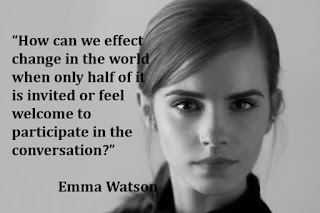I found the texts from Audre Lorde and Marilyn Frye both to be eye opening. Although I do consider myself to be a feminist, I feel as though I have been in somewhat in the dark on many elements of the title, however, I do not think I am the only one. Feminist movements have grown immensely popular and a flourish of widespread support has left us with so much more to learn and to discover, both within ourselves and others. It has left us a complexity of dark areas that are in desperate need of a light to be shined upon them in order to receive the attention that they beckon for. The feminist community is broad, and it is eclectic, but I believe that in, terms of context, it can be simplified in few ways, one of which being the to the idea that we all have differences but we also all have similarities, and neither should ever go unnoticed. This premise capitalizes on the principle of the "unity" within "community."
In my own circumstances, I believe that have never considered the diversity that is associated with the term "feminist" in the broad view. When the word "diversity" is used it is often paired with race alone, however, there is much more to it than this. The feminist community is diverse across many more aspects, as recognized by Lorde, to include sexuality, class, and age (Lorde 1). She highlighted this idea for me with her emphasis on the point that power is found through, "Learning how to take our differences and make them strengths" (Lorde 1). Previously I have only ever pondered the multiformity of the feminist population as a microscopic phenomenon, however Lorde's argument has informed of how contemplating it in a macroscopic focus, the phenomena discussed coming from Marilyn Frye's article,"Oppression," displays all the more power. Our differences are our strengths. As feminists we are a part of a network. There is interdependency between us, and there is liberation among us.
Valuable connections presented themselves not only within the two articles, but also to an objective that we touched on in class: Identities are intersectional. Lorde included a quote from Simone de Beauvoir that I believe captures the meaning behind this phrase best. He said, "It is in the knowledge of the genuine conditions of our lives that we must draw our strength and our reasons for acting" (Lorde 1). Both authors had a focus on this idea that we all have our own personal experiences that make us different, and our personal visions throughout them are essential to the basis of feminism itself.



I love your quote "The premise capitalizes on the principle of the "unity" in "community,"" because of the creative use of language, and also love how relevant and important that statement is to Audre Lorde's piece. I, too, believe that our differences must be celebrated as strengths in society and as feminists, we must become a much ore inclusive and unity oriented community. I also liked how you drew the connection between our discussion in class about how identities are intersectional to the pieces that we read for this week. I felt that by tying many of our readings and discussions together, you were able to display a very well-rounded perspective on the topic.
ReplyDeleteI love the focus on intersectionality in your post! Feminism is a tough umbrella term because so many different things fall under it, and it's easy for some of it to be lost. However, reading all of these texts about intersectionality of gender, race, sexual orientation, and other identities really reminds us to be cognizant of experiences different from our own. I really love your emphasis on females bonding together to form a coalition that is aware of these different identities and can accommodate and advocate for them.
ReplyDelete